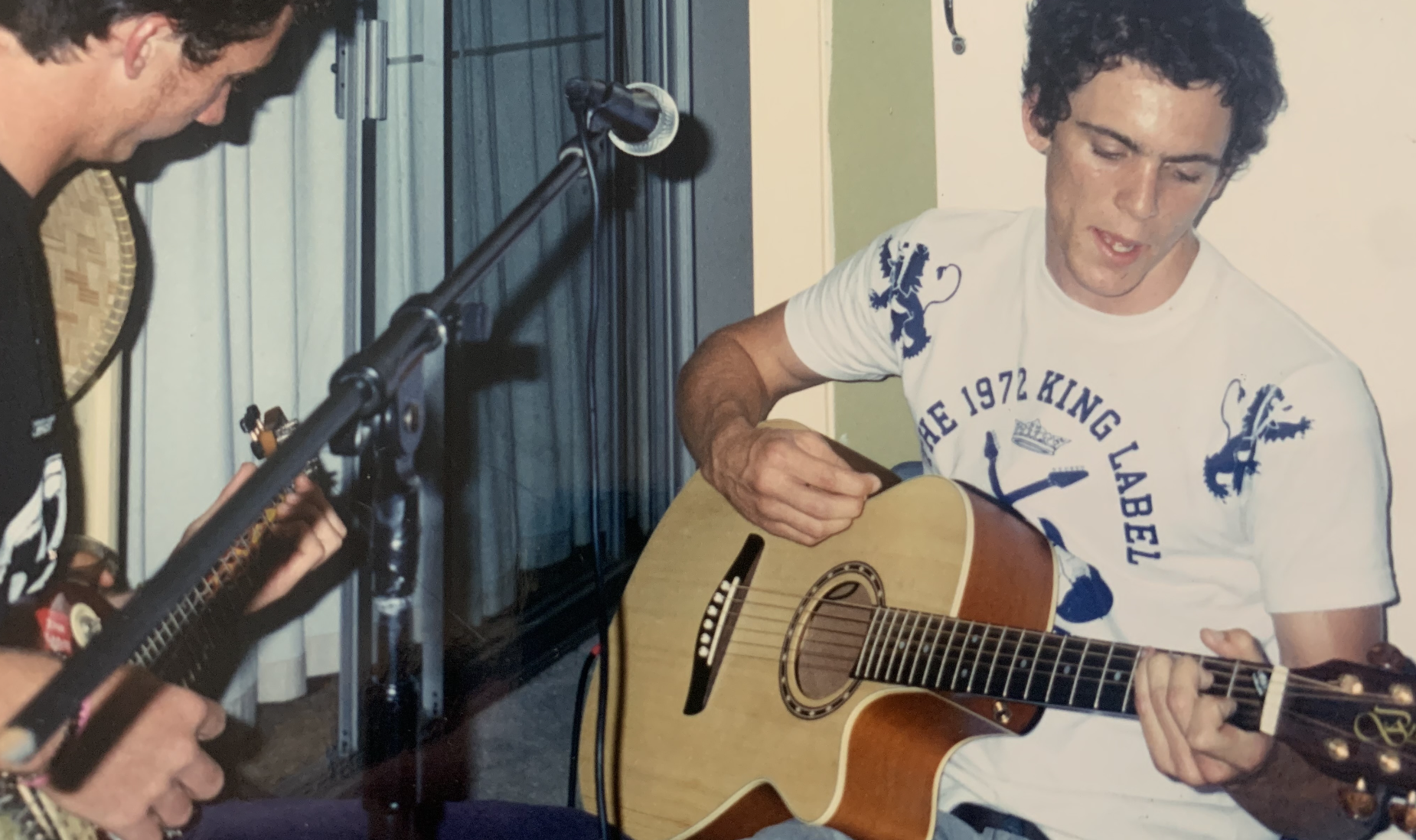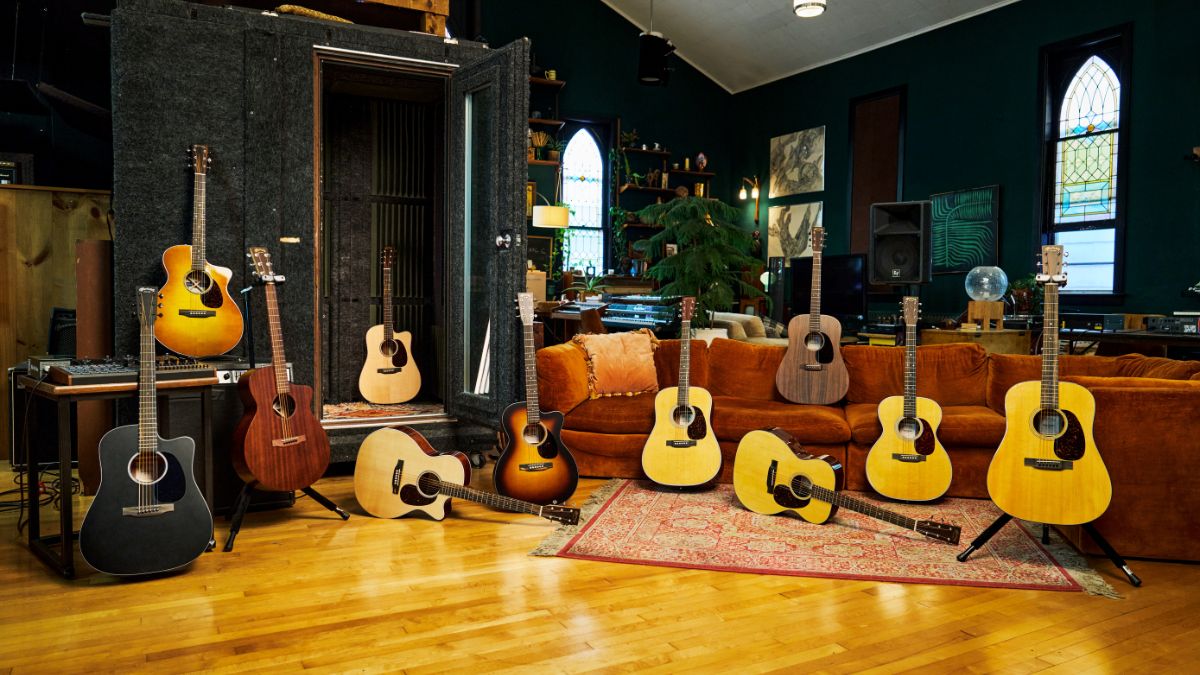The six-string origins of DZ Deathrays
As DZ Deathrays gear up to make some budding shredders' dreams come true, we look back on their own L-plater days

With their riff-heavy new album Positive Rising: Part 2 on the horizon, DZ Deathrays’ two guitarists look back on their first days behind the fretboard – and give three budding players the chance to make their own shreddiest dreams come true (head to the bottom of this page to find out how you can be one of them).
The First Spark
Shane Parsons: I was 13 years old, some of my friends at school had started to learn guitar from their older brothers and I was keen to get in on it too. Starting high school and discovering Nirvana, Rage Against The Machine and a slew of punk and rock bands from all over the world all led me to not only want to be a guitarist, but also a songwriter.
I think one of the first big moments for me wanting to be in the rock world was the 2001 Livid Festival in Brisbane. Seeing bands like The Hives rip apart the stage (like they are so well known for now) was a completely new thing for me. By this time I was in grade ten, living in Bundaberg where touring bands would hardly ever come through. You would occasionally get a band come to town and play the high schools or PCYC – I remember Sick Puppies playing a show at our high school and I couldn't believe how good it sounded.
We were completely starved for live music, so we played our own shows at school socials and house parties, and when we were allowed to, we would travel down to Brisbane and the Gold Coast to become sweaty little moshers at the Big Day Out and Livid.
Lachlan Ewbank: My brother and his mates used to jam at my house all the time, so that would be the first big moment of exposure. They also introduced me to bands like Nirvana, Faith No More, Mark Of Cain… The list goes on.
I remember going to the Big Day Out and seeing Regurgitator and Magic Dirt. That’s when I knew that I wanted to start my own band. I would jam with my brother and we eventually went on to start a band. I started out playing drums, but my brother wasn’t too keen on singing and playing guitar so I had to step up and do that job while he sat back on the drums.\
The First Axe
Shane: My first guitar was an Odessa acoustic, which my dad bought me for Christmas at the end of 1999. I remember visiting him on the Gold Coast during the school holidays. He had a carpet business at the time and I would travel around with him, but instead of going into the houses where he was working, I would sit out in the car for hours and just play the guitar. Before I learnt a song, I wrote a song. It was three single notes played terribly, but I still remember the feeling I got when I had created something. It gave me the drive to keep learning and trying to write songs.
All the latest guitar news, interviews, lessons, reviews, deals and more, direct to your inbox!
Lachlan: My dad bought me my first guitar when I was in high school. It was a black Squier Stratocaster. He was a big supporter of my music. I remember him buying drumsticks for our drummer, and he would even drive me into the city on school nights when we had gigs because I was underage. He would have to wait around until after the gig, then drive all the way home and be up for work early the next day. Bless.
The first guitar I bought with my own money was a Fender Jaguar HH Special. Not really knowing much about guitars, I remember falling in love with the shape and look of it. I still have that guitar to this day and recently got it set up and modified, so it’s been given a second life.
The First Lesson
Shane: I never had any lessons – maybe I should have, but I think this allowed me to find my own style. The only people who really taught me were my mates, who were also learning, and way more proficient in technique than I was. I really focused on learning chords and finding ways to augment them. Without any musical knowledge or the ability to read sheet music, I think I was just winging it. Whatever sounded good was enough for me.
Lachlan: I’ve never had a guitar lesson in my life, and it probably shows. Early on I learned how to play some chords from the internet, but that was it. I’m still not sure what most of them are. I feel like it helps me be more creative, as I don’t fall into certain rules or scales in my playing – I just play what I think sounds good to me.
The First Song
Shane: The first song I learned was the same as so many others out there: “Come As You Are” by Nirvana – followed closely by “Smells Like Teen Spirit”. When it came time to learn chords, I remember finally getting the full progression of “Hotel California”, which was not only tough to do because of the barre chords, but also because it’s quite a long progression to remember.
Lachlan: I started playing a lot of guitar in drop D, so there were a few Tool riffs I learned. I also remember doing an acoustic medley of Devin Townsend songs in year nine. The teacher said my guitar was out of tune when he graded me – I think I got a C. I don't think I really know how to play a song from start to finish apart from our own.
The First Idea
Shane: I'm sure there's a cassette tape full of emo love songs somewhere, and I hope it never sees the light of day. I used to have a stereo which you could record to tape on, so I would record my own songs from the first year I learned how to play. The learning happened alongside the creating, and I feel like I'm still the same now – constantly learning and creating at the same time.
The next step was learning how to play in a band with other people also figuring it all out as they went, including tracking demos using one cheap dynamic mic hanging from a ceiling fan to record a four-piece band. You’ve gotta start somewhere!
Lachlan: The first original material I wrote would have been real grunge. When I started out, I wrote more rhythmic, syncopated kind of riffs. They were also real easy to play and thrash around onstage to.
DZ DEATHRAYS' POSITIVE RISING GRANT
The DZ Deathrays - Positive Rising Grant is designed to assist and inspire the next generation of guitarists from regional Australia. The three recipients of the grant will each receive a Fender guitar and amp, plus a year's worth of fortnightly guitar classes through The Artist Studio.
Applicants can enter via dzdeathrays.com – entries are open now and will close on March 31st, 2021.
On the launch of the Positive Rising Grant, DZ Deathrays drummer Simon Ridley says, “One of the hardest hurdles starting out in music for me as a teenager was just being able to afford quality equipment that was not only actually enjoyable to play on but also capable of being used for a gig or even just an amp loud enough for playing with a full band.
“Also, growing up in a regional town, the quality and range of instruments available at the time was really limited. To be able to help people overcome that initial barrier and give someone the ability to jump straight into it is something I’m very grateful to be a part of.”

Ellie Robinson is an Australian writer, editor and dog enthusiast with a keen ear for pop-rock and a keen tongue for actual Pop Rocks. Her bylines include music rag staples like NME, BLUNT, Mixdown and, of course, Australian Guitar (where she also serves as Editor-at-Large), but also less expected fare like TV Soap and Snowboarding Australia. Her go-to guitar is a Fender Player Tele, which, controversially, she only picked up after she'd joined the team at Australian Guitar. Before then, Ellie was a keyboardist – thankfully, the AG crew helped her see the light…
